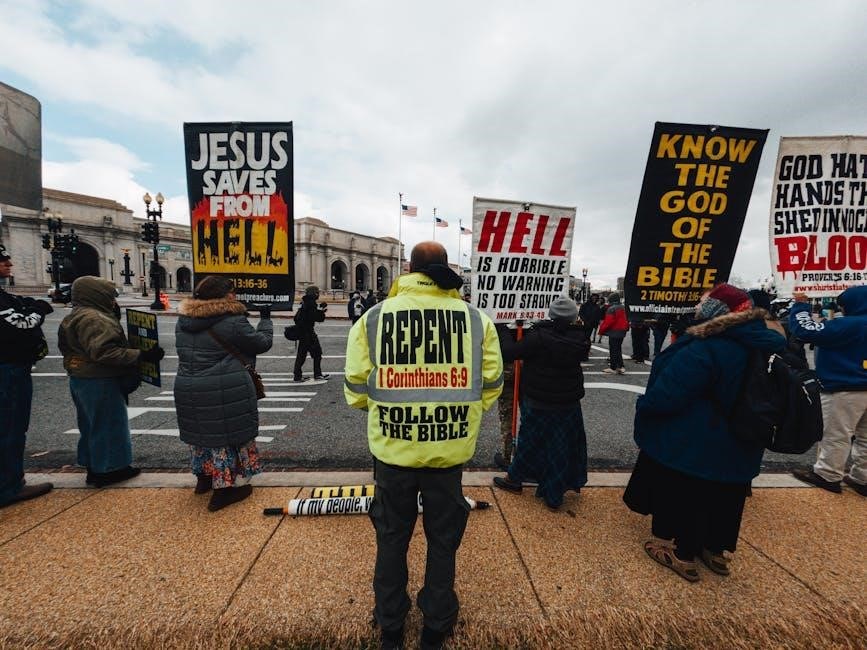Title: “Repent, Harlequin! Said the Ticktockman: A Dystopian Exploration by Harlan Ellison”
Explore the dystopian masterpiece where time is rigidly controlled, and rebellion simmers beneath a society obsessed with punctuality, as the Harlequin defies the Ticktockman’s relentless rule.
Harlan Ellison, a visionary speculative fiction writer, explored dystopian themes, societal critiques, and human resilience, crafting unique narratives that challenged conventions and captivated readers worldwide.
2.1. Biographical Background of Harlan Ellison

Harlan Ellison, born on May 27, 1934, in Cleveland, Ohio, was a prolific American writer, known for his work in science fiction, fantasy, and horror. He began writing professionally as a teenager, developing a unique, provocative style. Ellison’s contributions spanned novels, short stories, essays, and screenplays, including notable works for Star Trek and The Outer Limits. A fierce advocate for writers’ rights, he left an indelible mark on speculative fiction before his passing in 2018.
2.2. Significance of “Repent, Harlequin! Said the Ticktockman” in Ellison’s Bibliography
Repent, Harlequin! Said the Ticktockman stands as a cornerstone in Harlan Ellison’s bibliography, showcasing his mastery of dystopian themes and social critique. This 1965 short story earned Ellison both Hugo and Nebula Awards, solidifying his reputation as a visionary writer. Its exploration of time, rebellion, and individuality resonates deeply, making it one of his most celebrated works and a defining piece of 20th-century science fiction literature.
Plot Summary and Key Themes
Repent, Harlequin! Said the Ticktockman unfolds in a dystopian society where time is ruthlessly controlled. The Harlequin, a rebellious figure, defies the Ticktockman’s strict time regulations, symbolizing resistance against oppressive systems and celebrating individuality. The story explores themes of rebellion, time, and conformity, resonating with readers through its vivid portrayal of a society obsessed with punctuality and control.

3.1. The Dystopian Setting and Society in the Story
The story is set in a dystopian future where time is meticulously regulated, and society operates under a rigid master schedule. The oppressive regime, led by the Ticktockman, enforces strict punctuality, with severe penalties for lateness. This world, devoid of free will and creativity, highlights the suffocating nature of extreme societal control, emphasizing the loss of individuality and the dangers of a society obsessed with time and conformity.
3.2. The Role of the Harlequin and the Ticktockman
The Harlequin, a rebellious figure, defies the oppressive society by intentionally being late, challenging the Ticktockman’s rigid control over time. The Ticktockman, as the enforcer of societal order, seeks to punish deviations, embodying the regime’s relentless pursuit of punctuality. Their confrontation symbolizes the clash between individuality and conformity, with the Harlequin’s defiance representing a desperate attempt to reclaim freedom in a world dominated by the tyranny of time regulation.
3.3. Themes of Time, Rebellion, and Individuality
Central to the story are themes of time as a oppressive force, rebellion against societal norms, and the struggle for individuality; The rigid control of time highlights the loss of personal freedom, while the Harlequin’s rebellion symbolizes the enduring human spirit’s resistance against conformity. The narrative explores the tension between collective order and individual expression, emphasizing the importance of dissent in a society that values uniformity above all else.

Literary Awards and Recognition
Harlan Ellison’s “Repent, Harlequin! Said the Ticktockman” won the Hugo Award for Best Short Story in 1966 and the Nebula Award in 1965, showcasing its acclaim.
4.1. Hugo Award for Best Short Story in 1966
The Hugo Award for Best Short Story in 1966 was conferred upon “Repent, Harlequin! Said the Ticktockman,” recognizing its innovative storytelling and profound exploration of dystopian themes.
4.2. Nebula Award for Best Short Story in 1965
Harlan Ellison’s “Repent, Harlequin! Said the Ticktockman” received the Nebula Award for Best Short Story in 1965, acclaiming its bold narrative and exploration of time, rebellion, and individuality in a dystopian society. This recognition solidified its place as a landmark in science fiction literature, praising Ellison’s unique storytelling and thematic depth.
Critical Reception and Cultural Impact

Critics acclaim Ellison’s exploration of time and rebellion, influencing dystopian literature and sparking discussions on societal control and individuality.
5.1. Reviews and Analysis from Prominent Critics
Prominent critics praise Ellison’s originality and sharp societal commentary. The story’s exploration of time, rebellion, and individuality resonates deeply, with critics highlighting its timeless relevance. The Harlequin’s defiance and the Ticktockman’s ruthless order have become iconic, symbolizing the struggle between conformity and freedom. Reviewers often note the story’s masterful blend of dark humor and philosophical depth, cementing its status as a landmark in dystopian literature.
5.2. Influence on Science Fiction and Dystopian Literature
Ellison’s “Repent, Harlequin! Said the Ticktockman” has profoundly influenced science fiction and dystopian literature. Its exploration of time as a controlled resource and rebellion against oppressive systems inspired countless authors. The story’s unique blend of dark humor, philosophical questions, and societal critique set a new standard for dystopian narratives. Its impact is evident in later works that explore themes of individuality, conformity, and the consequences of rigid societal structures, ensuring its legacy in the genre.

Availability and Formats of the Story
“Repent, Harlequin! Said the Ticktockman” is available in PDF, epub, and mobi formats. It is also included in study guides, such as Gale’s, and translated into multiple languages, including Ukrainian.
6.1. “Repent, Harlequin! Said the Ticktockman” in PDF Format
“Repent, Harlequin! Said the Ticktockman” is widely available in PDF format, offering readers a convenient way to access this iconic story. It can be downloaded from various online platforms, ensuring accessibility for fans of dystopian literature. This format preserves the original narrative’s essence, allowing readers to engage with Ellison’s profound themes of time and rebellion effortlessly in a digital age.
6.2. Other Editions and Translations
Beyond the PDF, “Repent, Harlequin! Said the Ticktockman” is available in multiple formats, including EPUB and MOBI, catering to diverse reader preferences. Translations, such as the Ukrainian version by Bogdan Stasiuk, broaden its reach. These editions ensure Ellison’s timeless tale of rebellion and time’s tyranny remains accessible to a global audience, preserving its impact across languages and digital platforms.

Study Guides and Educational Resources
A study guide by Gale is available for “Repent, Harlequin! Said the Ticktockman,” offering insights for deeper analysis and classroom discussions of Ellison’s work.
7.1. A Study Guide by Gale for “Repent, Harlequin! Said the Ticktockman”
Gale’s study guide provides a comprehensive analysis of Ellison’s story, exploring themes, characters, and literary devices. It offers insights into the dystopian setting and the Harlequin’s rebellion, aiding students and educators in understanding the narrative’s depth. The guide includes discussion questions and critical commentary, making it a valuable resource for academic exploration of the story.
7.2. Teaching the Story in Academic Settings
Academic settings often use “Repent, Harlequin! Said the Ticktockman” to explore dystopian themes, rebellion, and societal control. Educators incorporate the story into curriculum to discuss individuality vs. conformity.
Activities include comparative analyses with other dystopian works and discussions on the psychological impact of time regulation. The story’s vivid imagery and moral dilemmas make it a compelling tool for teaching critical thinking and literary analysis.

The Harlequin’s Defiance and Its Significance
The Harlequin’s defiance embodies rebellion against oppressive societal norms, symbolizing the struggle for individuality in a rigidly controlled world, inspiring timeless reflections on conformity and freedom.
8.1. The Harlequin’s Rebellion Against Time Regulation
The Harlequin’s rebellion exemplifies a bold challenge to a society where time is meticulously controlled. By defying the Ticktockman’s rigid schedule, the Harlequin symbolizes resistance against oppressive order, questioning the morality of a world that criminalizes lateness. His defiance sparks a deeper critique of societal norms, highlighting the tension between individual freedom and collective conformity in a dystopian regime where time is treated as a scarce resource.
8.2. The Iconic Dialogue: “Get stuffed! the Harlequin replied, sneering.”
This iconic dialogue captures the essence of the Harlequin’s defiance. His response to the Ticktockman, “Get stuffed!” embodies a raw, unfiltered rebellion against authority. The sneer underscores his contempt for a system that dehumanizes individuals by reducing them to mere timekeeping subjects. This moment symbolizes the clash between individuality and oppressive conformity, resonating as a powerful statement of resistance in a dystopian world where dissent is fiercely suppressed.
The Role of Time and Punishment in the Story
In this dystopian tale, time is a rigidly enforced resource, with punishment for lateness being severe. The Ticktockman’s relentless regulation highlights the society’s obsession with punctuality and order, leaving no room for individual flexibility or humanity. This strict enforcement of time serves as both a means of control and a catalyst for the Harlequin’s rebellion, emphasizing the tension between societal structure and personal freedom.
9.1. The Concept of Time as a Strictly Enforced Resource
In Ellison’s story, time is treated as a rigidly controlled resource, with society demanding absolute punctuality. The Ticktockman enforces this system, monitoring every second of citizens’ lives. Lateness is met with harsh penalties, emphasizing the oppressive nature of time regulation. The Harlequin’s defiance, such as his iconic retort, “Get stuffed!” symbolizes rebellion against this relentless control, highlighting the tension between societal order and individual freedom.
9.2. Consequences of Being Late in the Ticktockman’s World
In the Ticktockman’s rigid society, lateness is met with severe penalties. Citizens who fail to adhere to the strict time schedules face physical punishment and time deductions from their allotted lifespan. The Harlequin’s defiance, accumulating a staggering delay of sixty-three years, five months, and twelve hours, exemplifies the oppressive consequences of rebellion in a world where time is controlled with an iron fist, leaving no room for individuality or freedom.
Ellison’s tale remains a timeless critique of societal control, earning Hugo and Nebula Awards, and continues to resonate in contemporary discussions about time and individual freedom.

10.1. The Timeless Appeal of “Repent, Harlequin! Said the Ticktockman”

The story’s enduring appeal lies in its exploration of timeless themes: rebellion against oppressive systems, the value of individuality, and society’s obsession with time. Its vivid imagery and moral complexity continue to captivate readers, making it a landmark in dystopian literature. The PDF version ensures accessibility, allowing new generations to discover Ellison’s profound critique of conformity and control, resonating as strongly today as it did upon publication.
10.2. The Story’s Relevance in Contemporary Discussions of Time and Society
The story remains highly relevant in modern discussions about time management and societal pressures. Its critique of a hyper-structured, time-obsessed culture resonates with contemporary issues like work-life balance and productivity. The PDF format of “Repent, Harlequin! Said the Ticktockman” ensures its accessibility, allowing readers to reflect on themes of individuality and conformity in a world increasingly driven by technology and efficiency.

